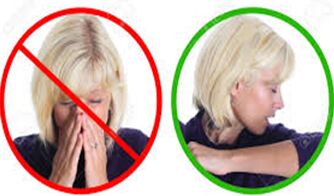你知道吗? 打喷嚏时应捂住口鼻 但不是用手!
When you feel a sneeze or a cough coming on, covering your mouth prevents the spread of infectious germs. You probably knew that.
当你感觉快要打喷嚏或咳嗽的时候,要捂住嘴巴防止传染性细菌的传播。这一点你可能知道。
But the way you cover up also matters, and there are plenty of people who haven't yet heard the consensus guidance of health officials: If no tissue is available, you should aim into your elbow, not your hand. Even if that means breaking a long-held habit.
但捂嘴的方式也很重要。很多人都没有听说过卫生官员给出的指导意见:如果没有纸巾,应该对着臂弯打喷嚏或咳嗽,而不是手掌。即使这意味着你要打破自己长期形成的习惯。
"If somebody sneezes into their hands, that creates an opportunity for those germs to be passed on to other people, or contaminate other objects that people touch," said Dr. Vincent Hill, chief of the waterborne disease prevention branch of the Centers for Disease Control and Prevention.
疾病控制和预防中心水传播疾病预防小组的负责人文森特·希尔博士称:“如果往手心里打喷嚏,就使得细菌有机会传播给其他人,或是污染这个人碰过的其他物品,”

Germs are most commonly spread by the respiratory droplets emitted from sneezing and coughing. When they land on your hands, they're transmitted to things like door knobs, elevator buttons and other surfaces the people around you are likely to also touch.
最常见的细菌传播方式就是通过喷嚏和咳嗽时喷出的飞沫。飞沫落在手上,就会被传递到门把手、电梯按钮等物体上,或是你身边的人可能也会触碰的其他表面上。
This isn't just us nagging. Sneezing and coughing into your arm has become the standard suggestion of not just the C.D.C., but also organizations like the American Academy of Pediatrics and the American Public Health Association.
这并不是我们太烦人。向着臂弯打喷嚏和咳嗽不只成了疾病控制和预防中心的标准建议,也成了美国儿科医生学会和美国公共卫生协会等组织的标准建议。
Even the New York City subway system occasionally runs an announcement asking riders to "cough or sneeze into the bend of your arm or use a tissue."
就连纽约市的地铁系统都会时常播送广播,要求乘客“向手臂弯曲处咳嗽、打喷嚏,或使用纸巾”。
You or your co-workers might be forgiven for not knowing that, since the suggestion is relatively new. The C.D.C. guidance has become official only in the last 10 to 15 years, Dr. Hill said.
这个提议相对较新,你和同事们对此并不了解也情有可原。希尔表示,疾病控制和预防中心的指南在最近的10到15年内才成为官方指导。
Dr. Georges Benjamin, executive director of the American Public Health Association, said he began seeing the suggestion more prominently about 10 years ago.
美国公共卫生协会执行主任乔治·本杰明博士表示,大约在10年前他才开始更加重视这些建议。
That means that adults may have missed the advice. Children, however, are frequently taught in school the proper way to cough or sneeze -- sometimes referred to as the Dracula cough, since it makes you look like the count covering up with his cape.
这就意味着成年人可能错过了这些建议。不过孩子们经常会在学校学习到正确的咳嗽或打喷嚏方式--它有时被称为“德古拉咳嗽”,因为这会让你看起来像是那位用斗篷遮住自己的伯爵。
Mary Anne Jackson, a professor of pediatrics at the University of Missouri-Kansas City School of Medicine, said the term "cough etiquette" first turned up in 2000, and she traced the suggestion to sneeze into your arm to 2003, when SARS fears were widespread. It gained further prominence in 2009, when the H1N1 swine flu pandemic struck the United States.
密苏里-堪萨斯城大学医学院的儿科教授玛丽·安妮·杰克逊表示,“咳嗽礼仪”这个词首次出现在2000年,她说,朝向手臂打喷嚏的建议可以追溯到“非典”肆虐的2003年。到了2009年,H1N1猪流感疫情袭击美国时,它进一步得到了重视。
To be clear, the maneuver doesn't eliminate all risk, even if it's the best tactic available. Studies have shown that even masks can't prevent all droplets from becoming airborne, Dr. Jackson said.
要澄清的是,就算这个办法是目前的最好手段,它也并不能消除所有风险。杰克逊教授表示,研究表明,即使是口罩也无法防止所有飞沫进入空中。
But anything to reduce the amount of flying particles helps. And health officials keep coming back to a drum that can never be beat enough: Make sure you consistently wash your hands.
但任何能减少飞沫数量的办法都是有好处的。卫生官员反复强调的这个观点再怎么重复都不为过:保证你经常洗手。
"Hand washing is one of the most important things people can do to keep healthy," Dr. Hill said.
希尔博士表示:“人们为了保持健康所能做的最重要的一件事就是洗手。”